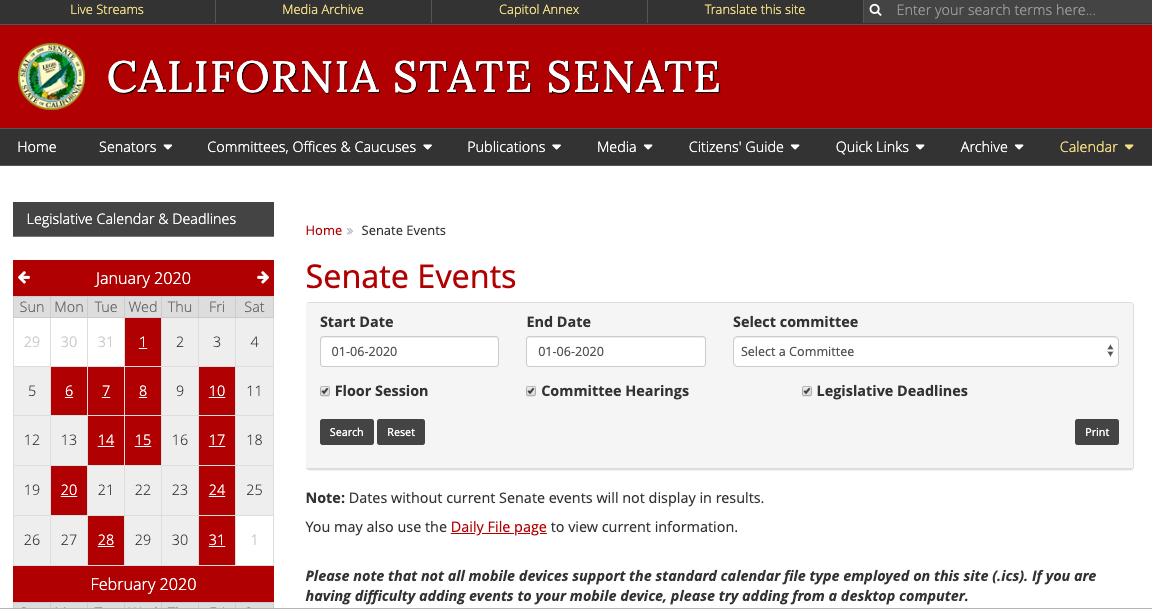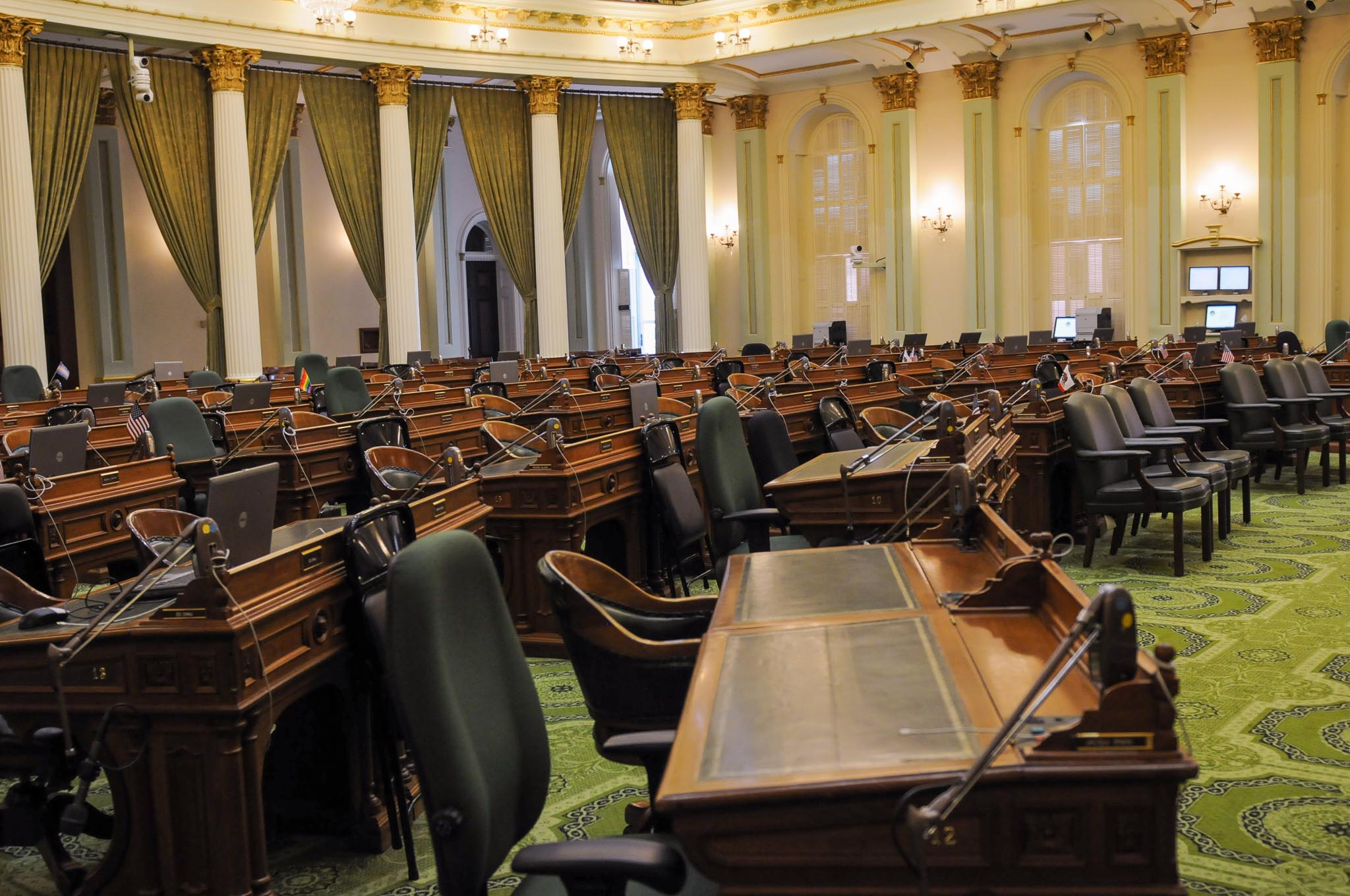
Printing of Legislative Documents
The State Printing Office prints the laws, initiative measures, public documents, Senate and Assembly,Journals, bills and resolutions
By Chris Micheli, October 5, 2024 1:13 pm
Section 9700 provides that all printing ordered by the Legislature or the Senate or Assembly, and all printing to be charged to legislative printing are governed by the joint rules and by the rules of the respective houses. After final adjournment, the rules in effect at the time of adjournment continue to govern until the adoption of rules at the subsequent session.
Section 9701 specifies that the receipt of the Secretary of the Senate or Chief Clerk of the Assembly is a sufficient voucher for printing for any work done for the house of which the person issuing the receipt is an officer.
Section 9702 provides that the Secretary of the Senate and the Chief Clerk of the Assembly must, prior to the convening of any session of the Legislature, order the printing of all legislative bills and constitutional amendments which have been approved for printing by the Committee on Rules of the Senate or the Committee on Rules of the Assembly. They must be printed by the State Printing Office, and the cost paid out of the appropriation for legislative printing.
Section 9703 requires the State Printing Office to print the laws, including initiative measures adopted by the people, public documents ordered to be printed by the Legislature, the Journals of the Senate and Assembly, and bills, resolutions, and other printing ordered by the Senate or Assembly.
Section 9704 specifies that the proceeds from sales of all documents, the cost of publication of which is or has been paid from any appropriation for legislative printing, are to be credited to the General Fund.
Section 9705 requires the general officers of the Assembly whose names and titles are to appear on the frontpiece of all publications sponsored in whole or in part by the Assembly.
Section 9708 provides that, whenever the Senate or the Assembly undertakes to publish in a separate volume the Constitution of the State of California and related documents, the text of such a volume is to be specified by the Joint Rules Committee.
Article 2 deals with the Daily Journals. Section 9720 requires the Secretary of the Senate and the Chief Clerk of the Assembly to determine what is a sufficient number of copies to supply the members of both houses and chief officers daily during the session with the Journal of the previous day’s proceedings of each house.
Section 9721 provides that a sufficient number of copies, with proper repaging, as determined by the Secretary and Chief Clerk, will also be bound at the end of the session of the Legislature as the Journals of the Senate and Assembly.
Section 9722 specifies that each Daily Journal and the Journals of the Senate and Assembly are to be printed by the State Printing Office. Each Daily Journal are to be printed in book form separately, and the Journals of the Senate and Assembly are to be bound in book form.
Section 9723 requires one copy of the daily Journal of each house, upon its approval by the house, to be authenticated as so approved by the Chief Clerk or Secretary of the Senate.
Section 9724 specifies that, upon final adjournment of the Legislature, the authenticated copy of the daily Journal of each house for the entire session must be properly bound in separate volumes and deposited in the office of the Secretary of State as the official journals of both houses of the Legislature.
Article 3 deals with the Legislative Manual. Section 9740 requires the Secretary of the Senate and the Chief Clerk of the Assembly to commence to compile, during the month of December in each even-numbered year, a legislative manual or handbook. The compilation is to be completed as soon as practical after the convening of the session.
Section 9741 requires the Legislative Manual to be uniform in size and style with similar publications of previous sessions. The Manual must include five types of specified information.
Section 9742 requires the Manual to be distributed to each Senator and Assemblyman as determined by the Rules Committee of the respective houses; each elective state officer, one copy, the State Library, each free public library in the state, and the Congressional Library at Washington, D.C.
Section 9743 requires the Secretary of the Senate and the Chief Clerk of the Assembly to each retain the number of manuals needed for use in the respective houses and for distribution to the Members of the Senate and Assembly for the succeeding session of the Legislature.
Article 4 deals with the preparation and printing of statutes. Section 9760 specifies that, whenever a law is signed by the Governor, official notice of the fact must be forwarded, in writing, to the State Printing Office.
Section 9761 requires the State Printing Office to print for the use of the Legislature such number of copies of the law, or joint or concurrent resolution, as is provided for by the rules of the Legislature and the necessary number of sheets to make the number of copies of the Statutes required by law to be printed.
Section 9762 states that, when a new or a revised code is established, it is to be prepared by the Legislative Counsel with all amendments and superseding sections enacted during the session properly inserted, and with proper notes indicating the original text and any intermediate amendments. The code is not printed until after 30 days after the final adjournment of the Legislature, and is printed by the State Printing Office.
Section 9763 requires the Department of General Services to direct the preparation of the statutes of each session of the Legislature after each regular session.
Section 9764 requires the statutes of each session to be prepared for printing and publication by the Legislative Counsel, the State Librarian, or other state agency authorized or required by law to render the service by the Department of General Services in writing.
Section 9765 requires the preparation of the statutes to include the making of an index and statutory record, and the delivery of them to the State Printing Office as soon as practicable after final adjournment of the Legislature. Also, the date of approval or adoption of each act and its effective date is prefixed to its text.
Section 9766 requires at the beginning of each volume of the statutes to include the state Constitution, the names and places of residence of the constitutional officers, Senators, and Assembly Members, and certificates of the Secretary of State showing what acts, or sections or parts of acts of the Legislature are delayed from going into effect by a referendum petition properly certified and filed in his office, as well as certificates of elections for initiative and referendum measures.
Section 9767 requires the Office of State Printing to print the number of copies of the statutes of each session prepared at the direction of the Department of General Services that the Joint Rules Committee determines is necessary.
Section 9768 requires the statutes to be bound in law buckram binding.
Article 5 deals with the distribution of statutes and legislative publications. Section 9790 requires the Department of General Services to maintain a bill-filing room for the Senate and Assembly, and file all bills, resolutions, journals and other documents ordered by the Senate or Assembly. It must also place all bills, resolutions, journals and other documents in binders for the use of the Members of the Legislature and perform such other duties in connection with their filing and distribution as may be required by the rules or special orders of either house.
Section 9791 requires the laws, resolutions and journals of the Legislature to be distributed by the Department of General Services to the Library of Congress, constitutional officers, each legislator, the State Library, the Attorney General, the Legislative Counsel Bureau, and the state Supreme Court.
Article 6 deals with reports to the Legislature. Section 9795 provides that any report required or requested by law, or identified in the Legislative Analyst’s Supplemental Report of the Budget Act, to be submitted by a state or local agency to a committee of the Legislature or the Members of either house of the Legislature generally, is instead be submitted as a printed copy to the Secretary of the Senate, as an electronic copy to the Chief Clerk of the Assembly, and as an electronic or printed copy to the Legislative Counsel.
Reports must include summaries of their contents of not more than one page. Report are not distributed to a Member of the Legislature unless specifically requested by that Member. State agency reports also have to be available on their websites for download.
- California Courts and Ex Post Facto Laws - December 21, 2024
- California Courts and Sunset Clauses in Statutes - December 20, 2024
- California Courts and the Legislative Open Records Act - December 19, 2024




